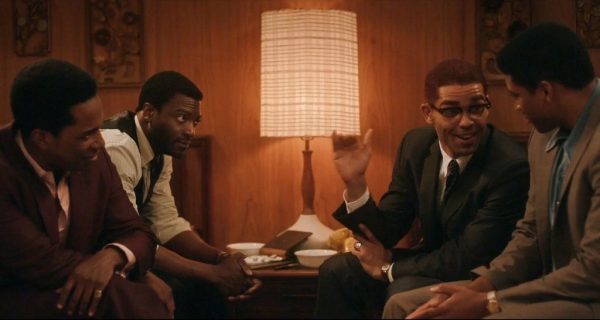One Night in Miami, 2020.
Directed by Regina King.
Starring Kingsley Ben-Adir, Eli Goree, Aldis Hodge, and Leslie Odom Jr.

SYNOPSIS:
A fictional account of one incredible night where icons Muhammad Ali, Malcolm X, Sam Cooke, and Jim Brown gathered, discussing their roles in the civil rights movement and cultural upheaval of the ’60s.

Regina King boldly adapts Kemp Powers’ acclaimed 2013 play “One Night In Miami” for her feature directorial debut, which while not quite mining the full cinematic potential of its revered source material, is nevertheless propelled by the efforts of a pitch perfect cast.
Powers’ play is a fictionalised account of what happened on the night of February 25, 1964, after Cassius Clay (Eli Goree) scooped a surprise title victory over Sonny Liston and went on to celebrate in a Miami hotel room with activist Malcolm X (Kingsley Ben-Adir), singer Sam Cooke (Leslie Odom Jr.), and NFL player Jim Brown (Aldis Hodge),
One Night in Miami is very much a film divided into distinct, delineated acts, with the opening reel proving both the least theatrical and the most procedural. King spends the first 20-or-so minutes fleeting from one of the four men to the next, establishing their careers and home lives in a fashion that might seem excessively expository were it not all so soulfully performed.
In these scenes, we see Clay score a mediocre 1963 victory over Joe Cooper in Wembley Stadium as well as his triumphant Liston fight; Cooke bombing a gig in a room filled with white faces; Brown learning first-hand what even a “nice” white southerner (played with restraint by Beau Bridges in a single scene) thinks of him; and Malcolm X attempting to juggle his personal and professional life while becoming increasingly concerned for his own safety.

Again, these primer scenes do feel like a bit of a tell-us-a-story prelude, yet are perhaps somewhat necessary, especially given the possibility that many audiences may not even know who Cooke and Brown are. Nevertheless, proceedings pick up considerably once Ali fells Liston and the after-party kicks off at the start of act two.
The remainder of the film is largely defined by their discussions inside four walls, ranging from throwaway banter about ice cream and other frivolities, to more overtly the place of the black man in American society, their own places in that conundrum as celebrities, and the ever-difficult subject of faith.
The room serves as a sounding board of-sorts for the four men to not only share the multi-faceted challenges of being black in America, but also to challenge one another. Cooke gets slammed for being a “bourgeois negro” who is all-too keen to hoover up money from predominantly white audiences, while Brown gets mocked for transitioning into Hollywood, where at the time he was largely relegated to “sacrificial negro” roles, as Clay puts it.
Unsurprisingly Malcolm X proves to be the most aggressive and agitational figure of the quartet, taking the men to task for not using their platform enough to enact change, while himself being ridiculed for his lack of civility. Ultimately this all boils down to ask one major question – what is empowerment? After all, it’s a word which has many different meanings to many different people.

Easy though it would be for a feature-length discussion such as this to feel like a lectern preach, the script – which was adapted from the play by Powers himself – is filled to the brim with witty, richly acid-tongued dialogue, putting necessary paid to both its complex ideas and the famous faces at the forefront.
But what truly brings King’s film to life is the riveting central four-hander. Eli Goree makes Cassius Clay far more of a nuanced human being than his swagger-happy popular persona might suggest, hinting at the man’s inner vulnerabilities on the eve of him joining the Nation of Islam. Hamilton star Leslie Odom Jr. not only captures Sam Cooke’s vocal aptitude with sure aplomb, but gets to sink his teeth into a character frequently called to defend himself against sellout accusations.
Aldis Hodge gets the least-showy of the four roles as Jim Brown, who also happens to be the most emotionally cool and collected of the four men, serving as something of a ballast when tensions flare – as they so often do. The beefiest part of the four is unreservedly that of Malcolm X, played with mesmerising plausibility by British actor Kingsley Ben-Adir. He is very much the X most of us know from news reel footage, but one rendered more of a human and less of a monolith with each new word he speaks here.
Collectively, the four make for a mighty team, aided by the efforts of a crackerjack ensemble cast; beyond the aforementioned Beau Bridges cameo, the ever-welcome Lance Reddick is perfectly cast as the Nation of Islam’s stern minder Kareem, while Christian Magby gets a small but fun role as Kareem’s young cohort Jamaal, and Michael Imperioli shines briefly as Clay’s trainer Angelo Dundee.
Of King’s direction, there is no doubt that she is a natural with actors – herself being one – yet on the basis of her debut perhaps also less of a stylist. Then again, this may well be an intentional flourish per the origins of the material – or a less-charitable reading would suggest she may have shackled herself a little too eagerly to the staginess of it all.
Much of the dialogue, though gripping, is shot in conventional shot-reverse shot form, which doesn’t make for the most visually interesting or even basically cinematic of experiences. Nevertheless, Tami Reiker’s solid lensing makes the best of it.
Despite that occasional fleck of detached sobriety, the engrossing dialogues and miraculously convincing performances are allowed to take center stage, free of any exterior embellishments. Regina King’s assured directorial debut doesn’t fully escape the trappings of stage-to-screen adaptations, but serves as a captivating actors’ showcase all the same.
Flickering Myth Rating – Film: ★ ★ ★ ★ / Movie: ★ ★ ★
Shaun Munro – Follow me on Twitter for more film rambling.











